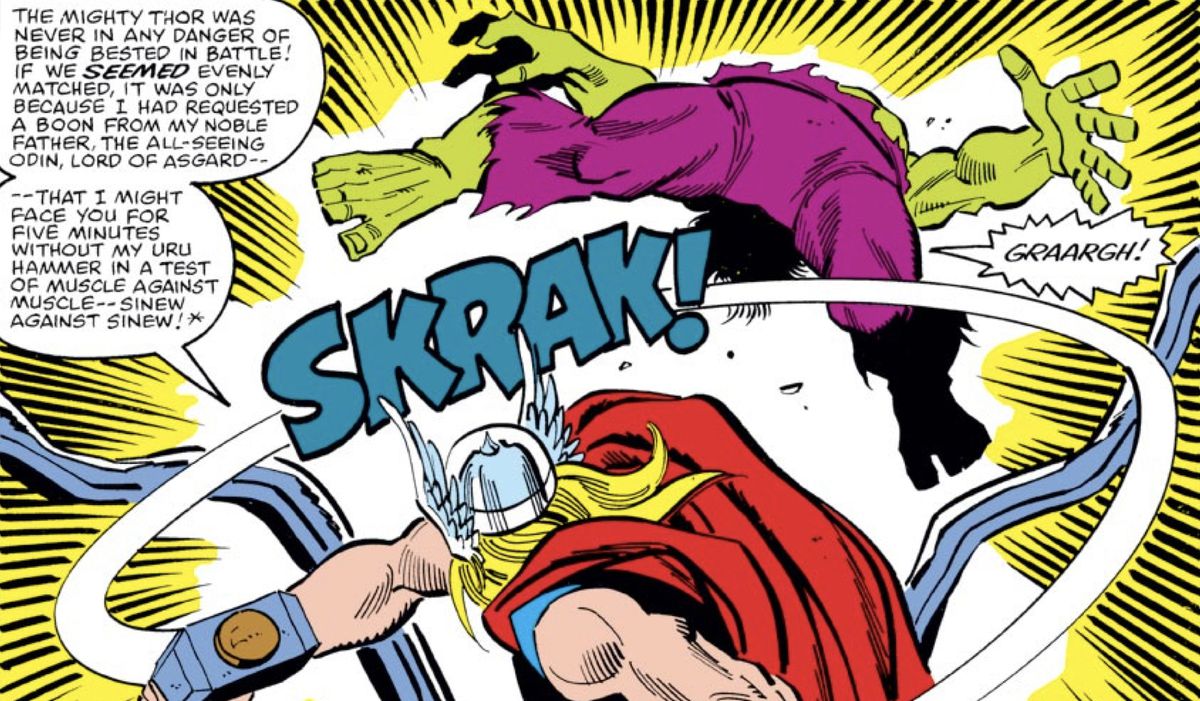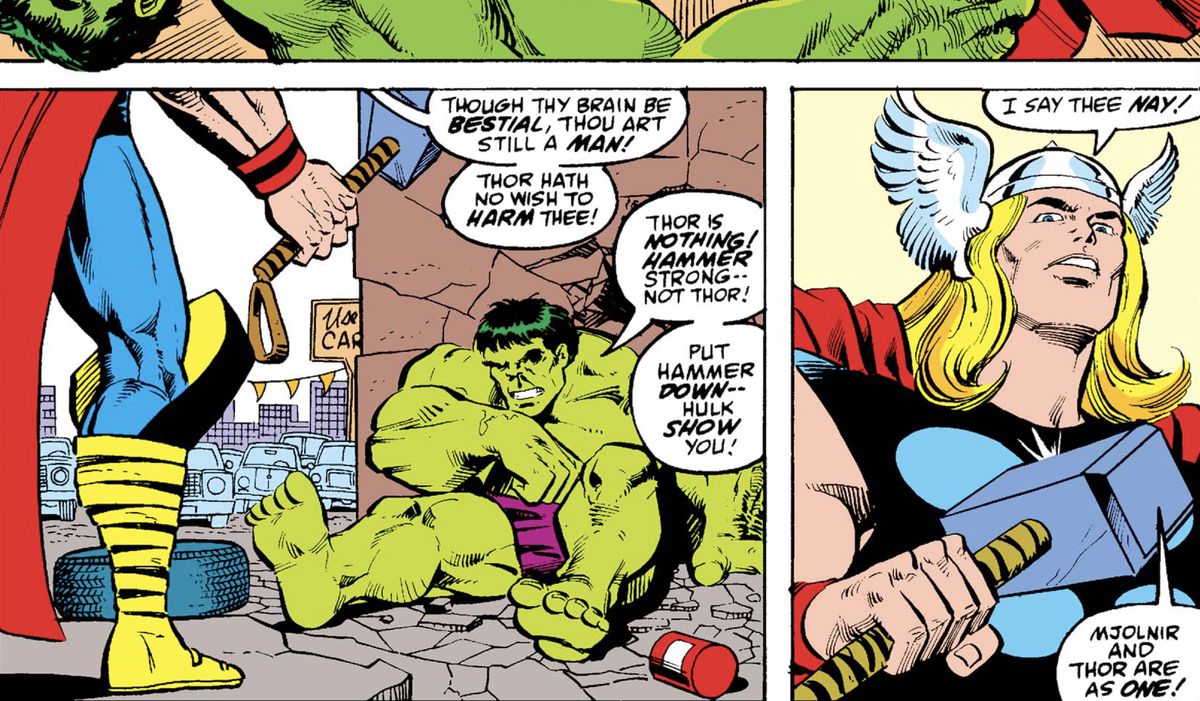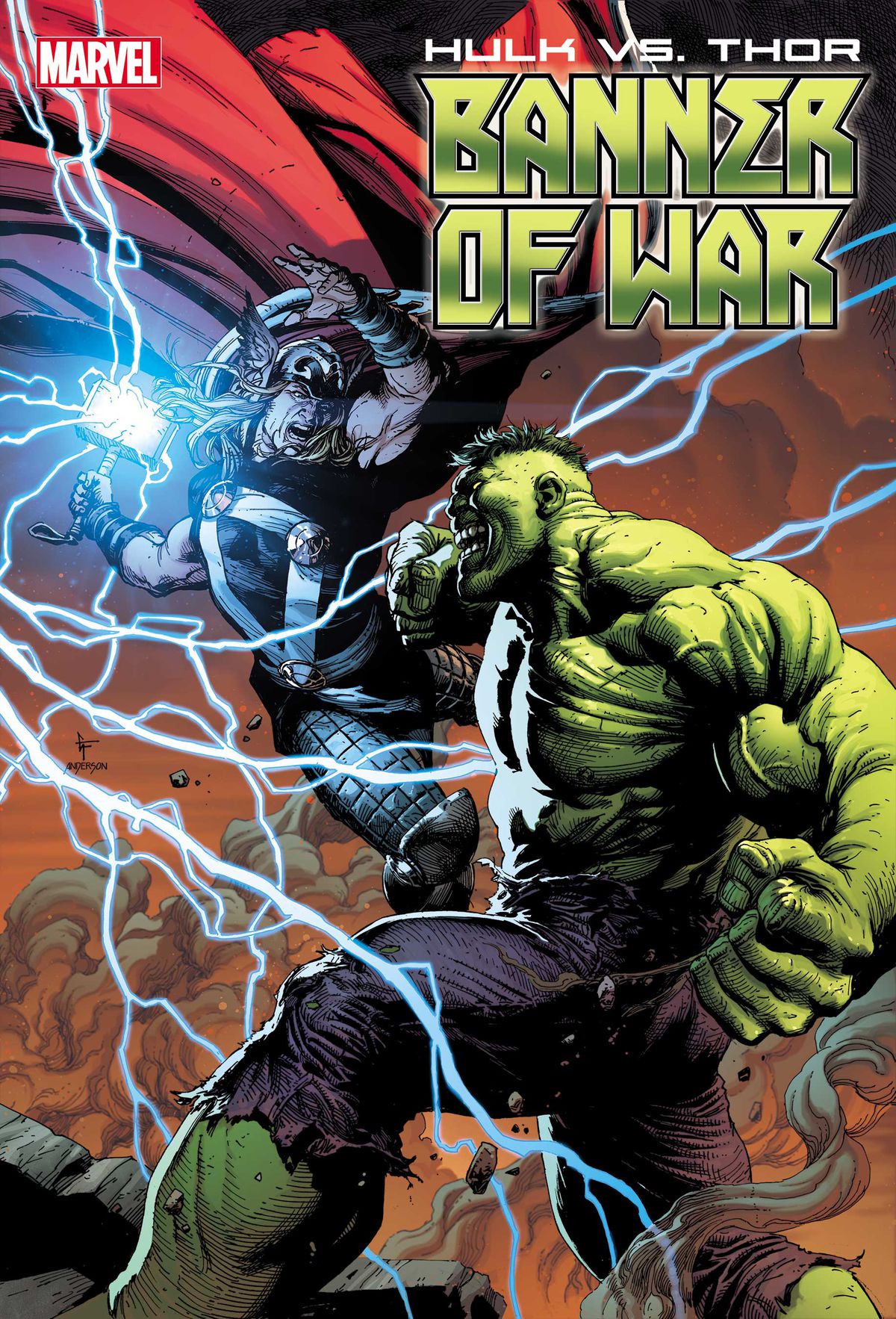The opening pages of 1965’s Journey Into Mystery #112 see Marvel’s thunder god swoop down from the skies to break up what looks, from Jack Kirby and Chic Stone’s dynamic artwork, like a riot about to break out between two gangs of angry, yelling youths. Thor’s thought balloon sets the scene for what’s happening: “Those youngsters seem to be arguing about who is … stronger … the Hulk … or myself!”
One eternal question spans all of pop culture: “Who would win?” That’s why we’re dedicating an entire week to debates that have shaped comics, movies, TV, and games, for better and worse. Prepare yourself for Polygon’s Who Would Win Week..
Journey Into Mystery #112’s cover declared it “The Epic Battle of the Age! The Mighty Thunder God vs. The Incredible Hulk! Here It Is! The Battle You’ve Been Waiting For!” (Of course, whether or not fans really had been waiting for the battle, or if that was merely Stan Lee’s trademark hyperbole, is a matter open to question.) The issue came out just three years after the comic book debut of both characters, and only one year after the two had met for the first time as co-stars of the then-newly launched Avengers. Yet, somehow, the rivalry of Thor and the Hulk had apparently already become such a hot button topic that Marvel was seeking to cash-in.
The thing is, Thor and the Hulk don’t really make sense as frenemies. They don’t share subgenre roots — one is a science fiction character, one a supernatural/mythological character. Or power level — any battle between the two should really be over in seconds because one of them is really strong, and the other one is really strong, is an actual god, and can fly and control the weather. Despite this, Marvel has spent decades attempting to convince fans that they do want the same thing as those teens from 1965. In fact, there’s a new fight between Thor and Hulk arriving in just a few weeks.
Here, fetch happened: “Hulk vs. Thor” is one of Marvel’s more storied clashes, no matter how weird, tenuous, or outright unnecessary these slugfests get.
The epic battle of the ages!
Most creators seem aware of just how ridiculous the whole thing is, and play into it. In 1973’s Defenders #10, the fight between Bruce Banner and Donald Blake’s alter egos ends in a stalemate as the two wrestle each other to a standstill for longer than an episode of Game of Thrones.
“Ten minutes they hold their pose, each straining futilely to break the status quo,” runs Steve Englehart’s breathless narration. “Twenty minutes they hold! Thirty minutes! One hour! Neither shows any signs of tiring!” (Their tussle is ultimately broken up by other heroes arriving.)
That the Defenders fight comes down to, essentially, a single wrestling hold is worth noting. As is the way Journey Into Mystery #112’s frames Thor vs. Hulk as a question of pure strength. It’s the only way for the rivalry to last beyond a couple of panels, and an ongoing theme of early attempts to explore and exploit fans’ desire to see the two fight — creative teams figuring out how to bring Thor down to Hulk’s level.
The earliest Hulk vs. Thor fights are a history of ways in which Thor is manipulated into surrendering his advantages. He asks Odin to un-magic his hammer so he can prove himself stronger, he’s blackmailed by the Hulk in order to throw the hammer away, or he’s goaded into a dick-measuring contest that would impugn his honor if settled through any means other than through natural strength.


OK, that last one’s on exaggeration, but barely; in 1981’s Incredible Hulk #255, Thor convinces no one when he boasts, “If we seemed evenly matched, it was only because I had requested a boon from my noble father, the all-seeing Odin, lord of Asgard — that I might face you for five minutes without my uru hammer in a test of muscle against muscle — sinew against sinew! Our fight then was indecisive!”
Sure, Thor. Whatever helps you feel better. To be fair, the Hulk’s as trapped in this toxic masculinity contest as anyone; in 1987’s The Mighty Thor #385, he yells, “Thor is nothing! Hammer is strong — not Thor! Put hammer down — Hulk show you!”
This dynamic — part-defensive, part-sibling rivalry, all machismo — has proven so potent that it crossed mediums. When the 1970s Incredible Hulk TV series was resurrected as a TV movie in 1988, The Incredible Hulk Returns brought Thor along for the ride. 2017’s Thor: Ragnarok gave Chris Hemsworth and Mark Ruffalo their best Marvel Cinematic Universe outings to date, repositioning their characters into a bickering, frenemy-like duo more closely resembling their comic book relationship — albeit both more comedic and more handsome, but that’s pretty much what audiences expect from the MCU at this point. Similarly, the two have faced off in animated incarnations across the years, including 2009’s direct-to-DVD Hulk vs. Thor animated movie. It’s a safe bet to say that, if fans of either character have been following them in whatever medium for long enough, they’ll have seen Thor and the Hulk fighting at some point or another.
So … what is it about Thor and Hulk that keeps fans and creators coming back?
Why titans clash (again and again)!
“I think the key thing is that they provide each other with someone on whom they can truly unleash,” says Wil Moss, who should know — he edits both Hulk and Thor at Marvel currently. “Both characters are so insanely strong, in most fights either they have to hold back to a degree — or the story has to handicap them in one way or another — or they win the fight fairly quickly. So I think a big part of the appeal of a Hulk vs. Thor fight is knowing that these two don’t have to hold back and it’ll be a fight that you know will really be one to remember.”
The subject, admittedly, is something that Moss has been thinking about a lot lately: Next month sees the release of Hulk vs. Thor: Banner of War Alpha #1, a one-shot story that sets the stage for a crossover between the two titles running until June. As the title suggests, it’s a storyline that will pit the two characters against each other one more time, but Moss teases that there’s more going on than just three months of non-stop slugfest.

Image: Gary Frank/Marvel Comics
“Don’t get me wrong, there is a lot of Hulk vs. Thor fighting in this story, but it’s not all fighting,” he promises. “There are some twists and turns in this story that really upend the dynamic between the two.”
Perhaps most surprisingly, Moss also promises that this latest match will provide something that more than half a century of fights has so far managed to avoid: a clear winner. Will those arguing teenagers from 1965 finally find out if Thor or the Hulk is stronger? The editor, mindful of spoilers, is playing it coy. “Writer Donny Cates and artist Martin Coccolo are cooking up a very surprising yet ultimately satisfying answer to that question, that’s all I’ll say.”
The end, then, may finally be in sight after more than half a century of uncertainty and confusion, allowing everyone inside both the Marvel universe and the regular universe peace of mind enough to move on to topics that really matter. Really, could Marvel’s United Nations band together to force economic sanctions on Latveria unless Victor Von Doom steps down from power? How could anyone in the Marvel universe be an atheist when there are literal gods in the Avengers? And, most importantly of all, who’s stretchier: Mr. Fantastic or Ms. Marvel?

